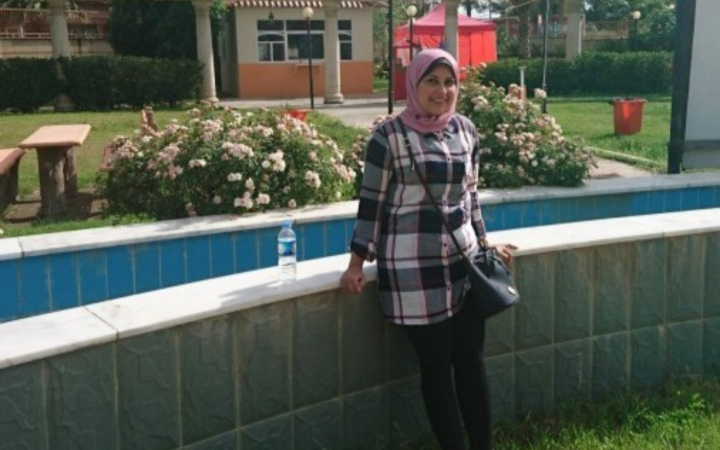Name: Salma Khalifa
Title: Product Development Manager, Savola Group Country Egypt
Course: FAO-UNITAR Joint e-Learning Course on Trade and Food Security (Arabic edition)
It is evident that women go to great lengths in order to pursue their education and professional careers. Decades of research show that women, particularly mothers, who are employed full-time end up working the equivalent of a "double shift" because they are usually in charge of most of the housework and childcare.
Salma Khalifa understands too well this reality of juggling work and family. A mother to a toddler, she is also a Product Development Manager at the Savola Group, a multinational that supplies numerous countries with edible oils, sugar, and fresh dairy products, as well as restaurants serving fast foods. “I work in the headquarters for the research and development department here in Cairo, Egypt, and I am responsible for new product developments in different countries within the MENA region, including Egypt, Turkey, Iran, Iraq, Morocco, and Algeria.” As if it were not enough, Salma is a PhD candidate at the American University in Cairo and conducts research on Global Public Health Management and Policy, specifically on food security.
One day, while researching the determining factors of physical, social, and economic access to sufficient, safe, and nutritious food in developing countries, Salma unintentionally came across the FAO-UNITAR Joint e-Learning Course on Trade and Food Security. “It was a convenient surprise because part of my job concerns the supply chain constraint of commodities and certain primary food ingredients faced in the MENA region, where the countries are big food importers. I was also interested to know certain aspects of the trading and supply chain related to food security and malnutrition, which could be of interest to my academic research.”
Salma decided to sign up for the online course and see whether it was indeed relevant to her work and PhD research. Her bet paid off.
I learned a lot of useful things. For instance, we saw how the traffic in some countries is affecting trade and, consequently, food supply in other countries. That was very interesting because now Egypt is facing a shortage in food supply due to current conflicts between countries and the increase in fuel prices. This information came in handy at work. As per my research, it just lit a light in my head that there is a research gap in food security and nutrition related to the dynamics of food supply, and these gaps are precisely what I am tackling in my PhD.
Salma’s favourite aspect of the course, however, was the opportunity to exchange with other participants and build a network. “Through the discussion platform, I have got to connect with policymakers, researchers and professionals working on the agriculture sector in different countries within the MENA region.” Salma recalls one occasion when another participant working on agriculture policy in Algeria asked her about a particular trade policy in Egypt that she was not aware of. She then contacted a work colleague in the supply chain department to learn more about the policy and share the information with the course participant. “It was a fortunate occasion because I gained new knowledge about one of my own country's policies.”
The interactions also opened Salma’s eyes to the complexities of policymaking. “Sometimes, we would discuss and compare policies from different countries, and we came to the realization that, in most cases, the policies in place may be the best set of rules and procedures to address the realities and peculiarities of a certain country. Yet, they may not be as effective if applied to other countries.”
One might wonder how Salma managed to find time for yet another commitment such as this. The answer is in the course format. “It is very accessible because all the content is available online.”
Not too long after finishing the course, Salma had the opportunity to join FAO’s Agri-Food Fellowship Programme, something she regards as a direct outcome of her participation in the course. As a fellow, Salma has supported the FAO Regional Office for Near East and North Africa, providing analytical and policy inputs on food security and nutrition and carrying out research focused on policy pathways for transforming agrifood systems in order to promote healthy diets.
To this day, Salma is applying the knowledge gained during the course to her work and research. “There are trade-offs when we apply healthy diet policies. One trade-off that can be affected is the relationship between trade and food subsidies. Part of the project that I am working on now with FAO, which is part of my academic research too, is about the trade-offs facing a healthy diet in developing countries, and I am actually using some of the data shared during the course.”
After finishing her PhD, Salma wishes to continue working with international organizations and NGOs on matters related to hunger and food security issues globally. We are excited to see her contributions to helping countries achieve zero hunger.


